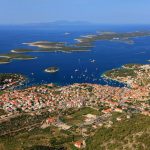ZAGREB, July 15, 2019 – Prime Minister Andrej Plenković said in Dubrovnik on Monday the demographic challenge was crucial for the survival of the Croatian nation, adding that the government’s measures had resulted in 400 more newborns in 2018 than in 2017.
Croatia is faced with negative demographic trends, he said at the international conference “Demographics, Jobs and Growth: Navigating the Future in Central, Eastern and Southeastern Europe”, co-organised by the Croatian National Bank and the International Monetary Fund.
In 1950, Croatia had 100,000 births and 50,000 deaths, whereas now there are 37,000 births and 51,000 deaths, Plenković said.
In order to tackle the demographic challenge, the government has raised parental benefits and the goal is that by mid-2020 they rise 110% from 2017, he said. More than 200 EU-funded contracts for building kindergartens have been signed, and 5,300 housing loan subsidies were approved in 2017 and 2018, so 20,000 families are expected to have new homes by next year, he added.
“Some negative trends are changing, so in 2018 there were 400 more newborns than the year before. A small step forward, but it nonetheless indicates that trends are slowly changing.”
Plenković said mothers would receive full salaries for a full year of maternity leave, fathers would get at least ten paid leave days and parents would be enabled to work from home. “We are confident that our efforts to reverse the demographic trends will yield results and that positive demographic trends will follow.”
He went on to say that at the Croatian government’s initiative, demographic challenges were included in the EU’s strategic programme for the next five years. He said this would provide an opportunity for helping what was being done nationally through European policies and funds.
Responding to questions from the press, Plenković said IMF representatives acknowledged the government’s achievements, such as lower unemployment, higher employment, active employment measures, economic growth, and exits from the excessive macroeconomic imbalances and excessive budget deficit procedures.
Those achievements also include the restoration of Croatia’s investment credit rating, fiscal consolidation, investments, structural reforms in education, pensions, taxes, the judiciary and public administration, a more even regional development, digitisation and catching up with the fourth industrial revolution, he added.
“All that is a package that will give answers to demographic policy questions,” Plenković said, adding that a change of mentality was also needed.
As for the labour shortage and the import of workers, he recalled that Croatian citizens could work in 26 EU member states without permits and quotas, saying that too was impacting demography.
He recalled that late last year Croatia adopted a decision on the hiring of 65,000 foreign workers based on industry demands. If we want to move forward, we must have people working in various industries, he said, adding that any EU citizen could come to work in Croatia.
Plenković said the government wanted to activate as many registered jobless as possible, adding that everyone willing to work could get a job. “It’s also our goal for the pay for that job to be adequate and in that way to raise their living standards and our economy.”
More news about demography can be found in the Politics section.








